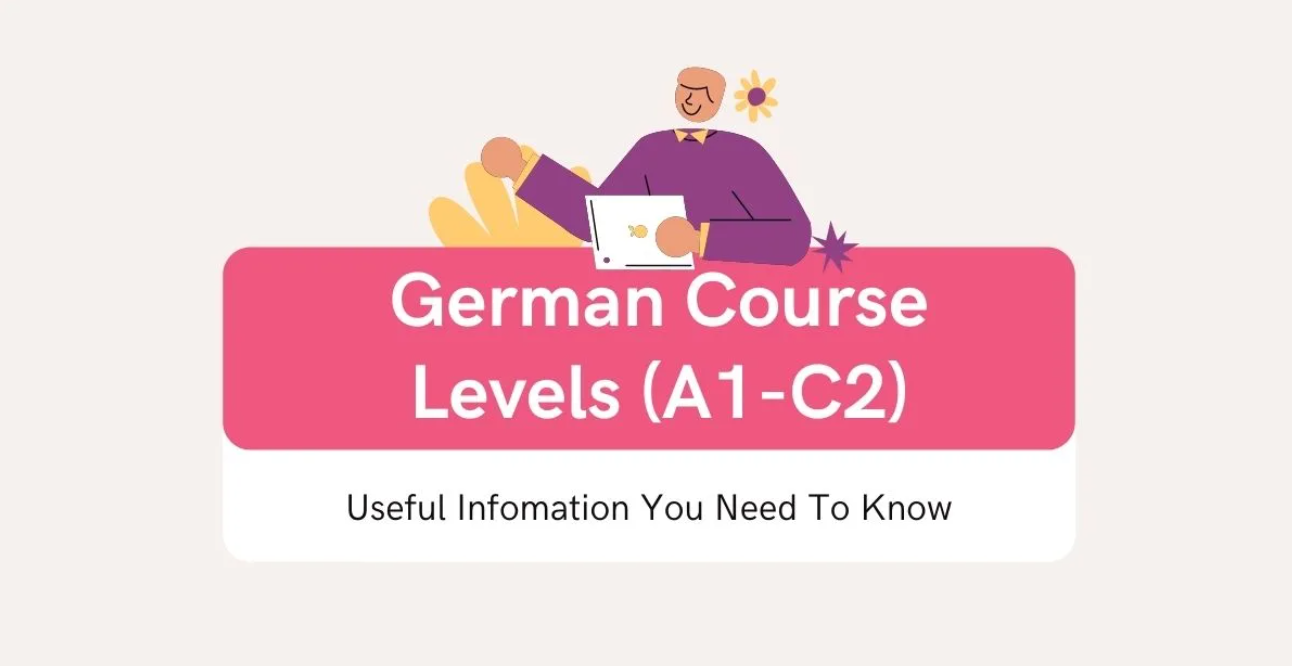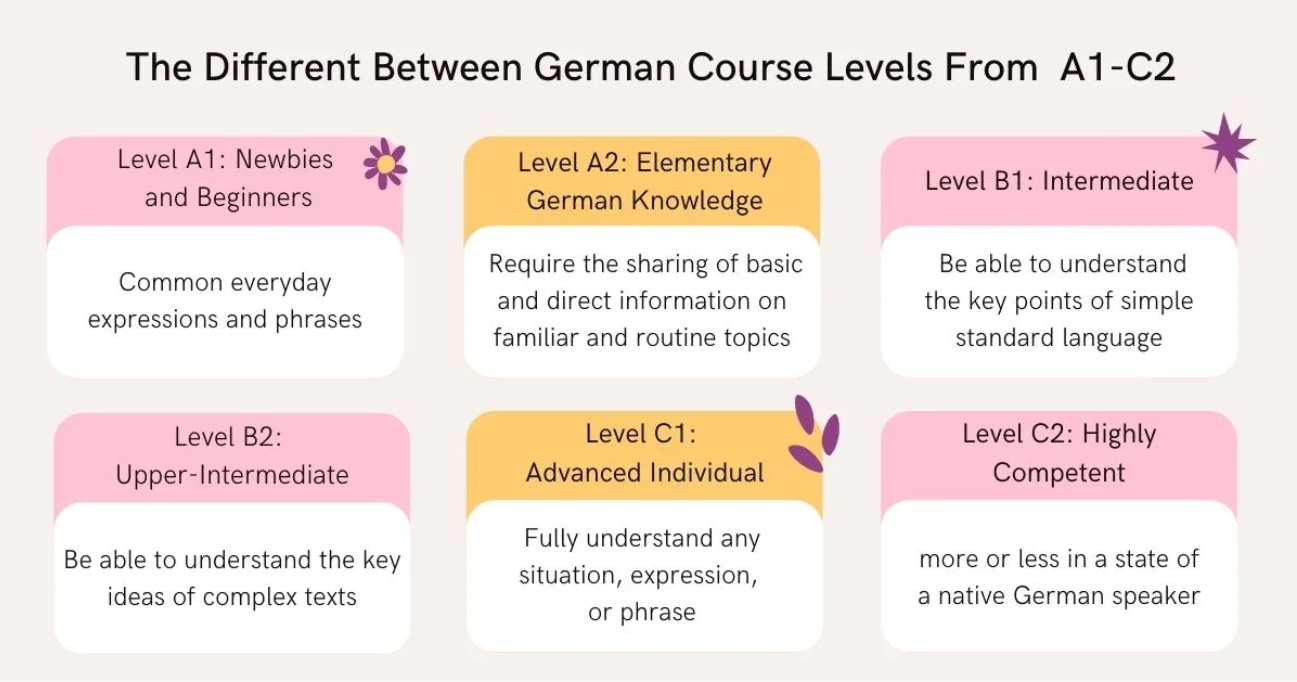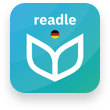
Do you want to know what level of German you’re at? Or have you just started learning the German language and want to know what waits for you? Then this article is for you.
It might not be as clear as you may think to understand the German course levels, as different topics might vary for different schools or platforms. Today, let us show you a general and detailed specification of the German course levels so that you can learn which topics are awaiting you in the future.
German Course Level Specifications
Here are the official names for each language learning level according to the CEF (Common European Framework):
| A1 | Beginner |
| A2 | Elementary |
| B1 | Intermediate |
| B2 | Upper-intermediate |
| C1 | Advanced |
| C2 | Highly competent |
Short Overview
German Course Level A1
This level should include: learning German vocabulary basics, such as alphabet, pronunciation, and introductions, as well as simple topics from German grammar.
Result: you can understand simple sentences and get along with the very basic vocabulary.
German Course Level A2
Information you learn: most grammar points, longer sentences, common phrases.
Result: You know how to deal with everyday situations in German.
German Course Level B1
What you learn: you deepen your knowledge of familiar and common topics, as well as deal with more advanced grammar points.
Result: You can read, write and understand more sophisticated topics and understand and express varying topics and opinions, mainly about things you’re interested in. You are able to have a simple and direct exchange of information with the native speakers.
German Course Level B2
What you learn: you broaden your vocabulary even more and fully understand different points from German grammar.
Result: You communicate naturally and without difficulty with all native German speakers, no matter their level of spoken German or education. You can read fluently and fully understand what’s written in a proper newspaper or a novel.
German Course Level C1
At this stage, you can fully understand any situation, expression, or phrase when the German language is used. You have a wide range of specific terms and terminologies. You can eloquently express your opinion and write essays naturally without thinking much about what to say or write in German.
German Course Level C2
At this stage, you’re more or less in a state of a native German speaker. Depending on their level of education, you might even be better than some native German speakers with very basic school education. German is also hard for Germans, and some people are just not interested in talking and writing proper German, so you might be better at it than some Germans.
At this stage, you can easily communicate with professors and highly sophisticated people about any topic and have a wide range of German words that might not be common.
Extended Explanation
Here’s a short overview of the basic knowledge you have at different stages of learning a foreign language:

Level A1: Newbies And Beginners
After completing this stage, you will be able to understand and use common everyday expressions and phrases. You have the potential to introduce yourself and others. You can also ask and answer questions about personal information like where you live, who you know, and what you own.
You should be able to communicate in a straightforward manner and have a simple and direct exchange if the other person speaks slowly and simply and is willing to assist you.
Level A2: Elementary German Knowledge
When you finish this stage, you’ll be able to understand sentences and common expressions in places that are most important to you right now (e.g., very basic personal and family information, shopping, local geography, employment).
You should interact in simple and routine tasks requiring the sharing of basic and direct information on familiar topics related to the related to areas of most immediate relevance. In simple terms, you should be able to describe your background in simple terms & aspects, as well as talk about your immediate surroundings and immediate needs.
Level B1: Intermediate
You should be able to understand the key points of the simple/standard German language when talking about common topics encountered frequently in work, school, leisure, and other situations by the end of this stage. When traveling in an environment where the language is spoken, you should be able to deal with the majority of situations that will occur.
You may write easy, linked texts about topics that are familiar to you or that are of personal interest to you. You can briefly explain and justify your views and plans by describing experiences and events, dreams, expectations, and goals. You can understand the key points of the discussion if the speaker uses plain language and talks about common topics such as work, education, leisure, and so on.
You should be able to deal with the majority of situations where language knowledge is required, such as those that arise while traveling around Germany. You can talk about familiar subjects and personal interests in a clear and concise manner. You can share your personal experiences, hopes, and life goals and provide brief explanations for your plans and opinions.
Level B2: Upper-Intermediate
You are able to understand the key ideas of complex texts on both concrete and abstract subjects, as well as technical discussions in your field of specialization by the end of this stage. You can converse with a level of fluency and spontaneity that allows you to have daily conversations with native speakers without straining yourself or your conversation partner.
You can write straightforward, concise texts on a variety of topics and describe your point of view on a current issue, including the benefits and drawbacks of different options. You can come to understand the basic concept of challenging texts, such as specialist texts from a specific area.
You should be able to communicate naturally and without difficulty with native German speakers, wish to articulate your own point of view and the reasons behind it, and be able to easily understand and share information related to their interests and specializations.
Level C1: Advanced Individual
After completing the C1 german courses, you will be able to comprehend a wide range of challenging, longer texts and recognize implicit meaning. You are able to express yourself fluently and naturally without having to look for words. You have the ability to use language in a variety of ways for social, academic, and professional purposes.
You may write a simple, well-structured, informative text on complex topics using organizational patterns, connectors, and cohesive devices in a controlled manner. You can understand both demanding and longer documents, as well as tacit interpretations. You will be able to express yourself fluently and instinctively without looking for words, use the language efficiently and flexibly in daily, social, and professional life, and express yourself simply and structurally on complex topics.
Level C2: Highly Competent
By completing this stage, you should have shown that you can comprehend almost everything you hear or read. You may summarize facts from a variety of oral and written sources, as well as recreate claims and accounts in a logical manner. Even in more nuanced contexts, you can express yourself instinctively, fluently, and precisely, distinguishing finer shades of language.
After the C2 German classes, you should be able to understand almost anything at a level of a native speaker. You may synthesize data from various sources and present justifications and hypotheses in a consistent manner. You have the ability to express yourself quickly, fluently, and accurately, as well as explain subtle nuances within complex topics.
Level Up
The only way to get better and move to the higher levels of the foreign language is through practice. You can learn German and know all the grammar – but if you don’t practice it, you won’t be able to become fluent and use your level of German in everyday life.
So better start practicing now and do that regularly. And, to make the process easy, enjoyable, and straightforwards, try out Readle – Learn German app. Just read interesting news and stories in German every day, and you’ll learn new things without putting much effort into it. You can choose the stories based on your knowledge level – just check it in the beginning by completing a short placement test.
With Readle, you can learn everyday German slowly and clearly as well as have fun and prepare for your next visit to Germany.
